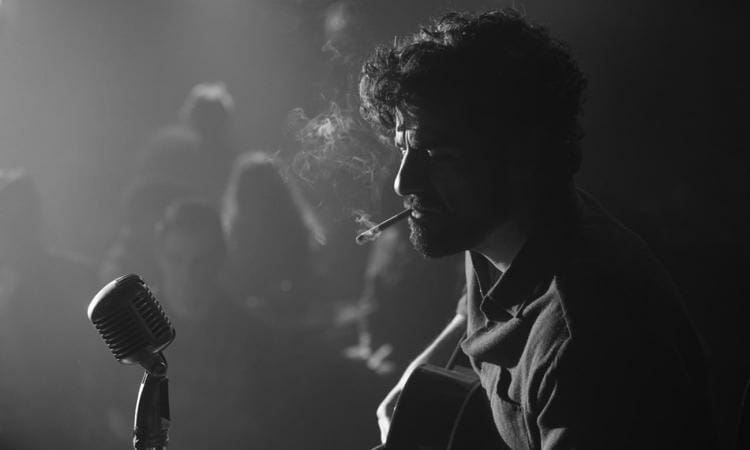Sign up for the
TSL Newsletter
and get $50 off Final Draft 12
By Patrick Kirkland · December 9, 2013

I'll be honest; I've had a hard time writing this review. On the one hand, the Coen brothers are two of my favorite filmmakers: their clear defined voice that carries all of their scripts, their bits of randomness that seem to have a big impact on the protagonist's journeys, and their insistence on violence. On the other hand, Inside Llewyn Davis is a paced, slow, and ultimately sad venture through the New York folk music scene of 1961. But does that mean I liked it any less than the rest of their repertoire? It's that question that I can't put an answer to.
Inside Llewyn Davis tells the story of the Llewyn Davis (played by Oscar Isaac), a virtually homeless folk singer trying to make it as a solo artist after his partner jumped off the George Washington Bridge, as set up in the trailer with a fantastic line delivery by otherwise bit player John Goodman. (It's actually a shame the trailer gives this piece of information away, because it's a great reveal just after the halfway mark.) It's a moving story, if not a little too real, especially for those of us who know what its like to struggle for the sake of art.
I'm normally good at picking up act breaks, but in the case of Llewyn, it's tough. There's a semi-call to adventure fifteen minutes into the film, when Llewyn learns that his then couch mate, another folk singer, has representation in Chicago, but it takes almost twenty-five minutes for Llewyn to answer that call. Indeed, like all Coen brothers films, this one takes a very non-traditional approach to a telling a traditional story: an "artist" that wants success.
It's not a success tale, it's not a rags-to-riches tale, it's not even a story that really hinges on its protagonist's arc. There's not even a real Hero in the film. Llewyn Davis, for the most part, is a loser. He milks money and beds from whoever will take him. He's not great at conversation, and, like Coen character Barton Fink, looks down on everyone else. He's not even a character who fights, but one who takes it, over and over again, only to feed it into his music.
But that's where the script excels. Nothing, I mean, nothing is easy for Llewyn, whether it’s getting representation or taking care of a house cat. His struggles are such minute tasks that it makes you feel for the character, even kind of relate, and before you know it, you want him to succeed at… anything.
The inside view into the world of pre-Bob Dylan folk and it’s characters is fascinating. Llewyn's music, produced by the legendary T Bone Burnett and sung by Isaac, emotionally grabs and hurts the viewer every time he plays, whether its in a car, a dinner table, or a bar. The side characters are one note, but the one note has depth. Carey Mulligan, Justin Timberlake, and F. Murray Abraham are wonderful blockers for Llewyns' journey, and longtime Coen actor John Goodman is wonderful as the horrible Roland Turner, with whom Llewyn rides from New York to Chicago. Even though he's on screen for maybe 20 minutes, his presence looms over the entire second half of the film.
In the end, I was left both satisfied and unsatisfied. It seemed like not much happens, but at the same time, I felt good about the long journey the film takes – and it does feel long. The scenes are almost the same in tone and length, giving the film a metronome quality, ticking it's way to the end. But a piece of dialogue tips the hat that the Coens are aware of this, if not doing it purposely. Was it worth the watch? Absolutely. There is comedy here, but in the form of torture. It's a grounded film, careful about its showmanship. It's much closer to art than any of their recent works, if not all. But the characters… oh, those characters, and that music, make it all worthwhile.